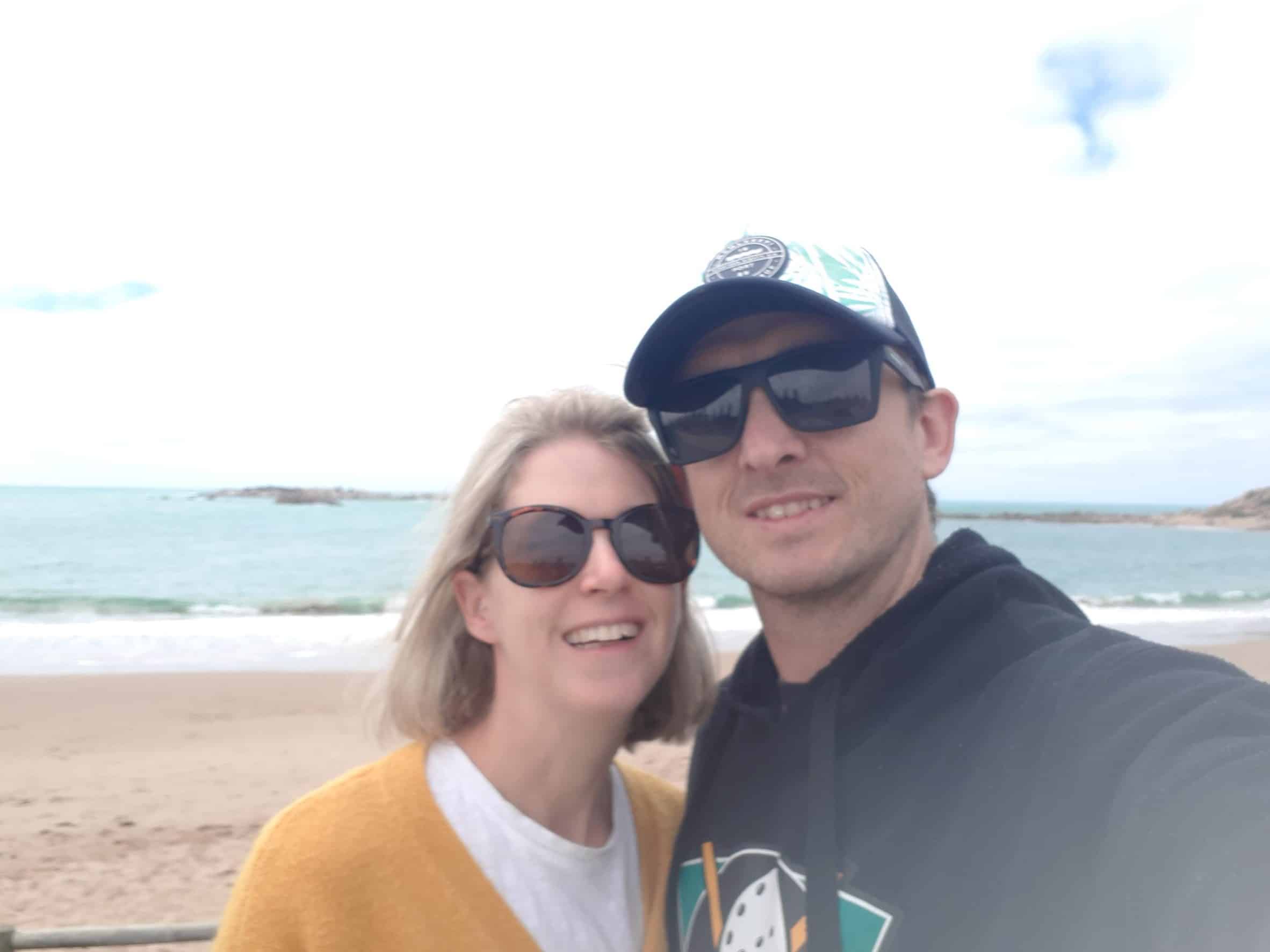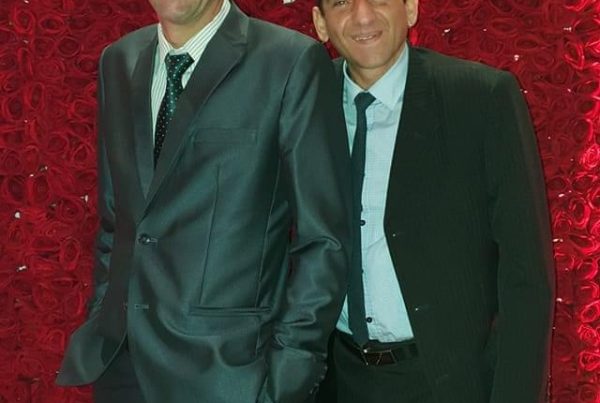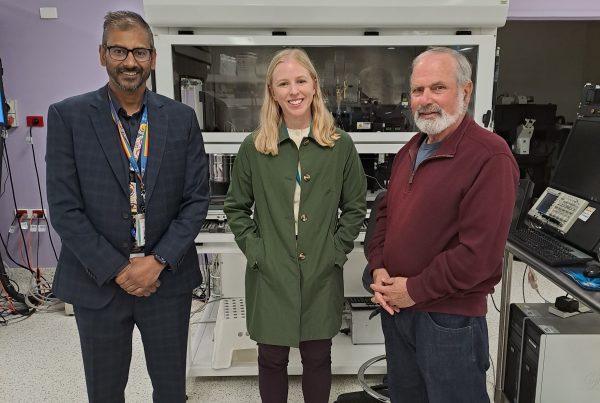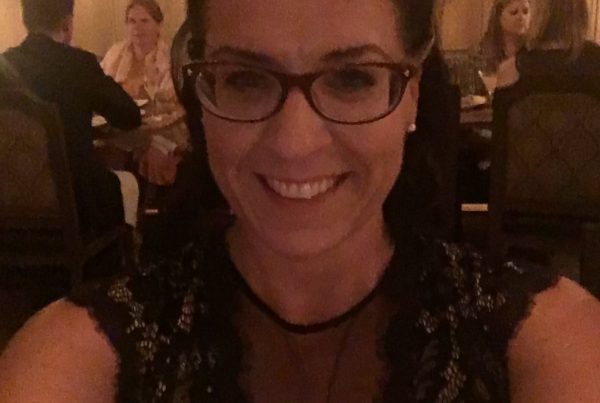Podcast: Play in new window | Download
Subscribe: Apple Podcasts | RSS
CFPhysio and navigating fatherhood part 1
This episode of the CFStrong podcast is thanks to our collaboration with CFPhysio

Sam, a young man with a dedication to his daily routine, and his health shares with us some of his journey with CF. Sam, who has a very full plate of life, on top of juggling a chronic health condition walks us through some of the challenges, the ups and downs, and the decisions when starting a family. Sam is honest in sharing his experiences learning how to prioritise the things that bring him joy whilst upholding the tasks that keep his health.
This first episode join Sam and his physiotherapist Robyn as he shares some of his early life with CF and his health journey.
Transcript
Jen: Hello, and welcome to the cfphysio.com and CF Strong Collaboration podcast series. My name is Jen Hauser. I’m a physiotherapist with almost 20 years experience in cystic fibrosis care and the project lead for cfphysio.com. Together with CF Strong, we have joined forces to bring to the CF community real life insights and personal experiences on all things physiotherapy and CF.
Cfphysio.com is a not-for-profit organization, striving to deliver evidence-based education in CF physiotherapy management to healthcare workers and individuals impacted by CF. CF Strong is a website designed to inform, educate, and empower adults impacted by CF through the sharing of individual’s personal journeys of living with CF. We hope you find some value from listening to the podcast we bring to you in this series.
Please remember, the content is not intended to replace your usual healthcare. Please discuss any concerns or questions you may have with your healthcare team.
Hello and welcome back. I am feeling very grateful today to have the two people in the studio that I have. We are covering a topic that I feel is a little bit silent and often doesn’t get the spotlight that it should. As I said, gratitude is the word for today’s session because I am very grateful to have Sam with us. Sam is a senior physiotherapist in the community with a specialty in falls and balance. He’s married and he has a baby son Caleb, who’s nine and a half months old.
He’s a keen exerciser and he’s engaged in Tough Mudder amongst other high-intensity pursuits. Just to add a little bit more to his juggle in life, he’s also an assistant pastor at his local church, and I haven’t forgotten, but Sam also has cystic fibrosis. He’s here in the studio today with his physio Robyn Cobb, to share with us a little bit about his journey in fatherhood and managing that juggle of work-life and health balance navigating all of those journeys.
Robyn: is a senior physiotherapist of the adult Cystic Fibrosis Center at the Prince Charles Hospital in Brisbane with 20 years of cystic fibrosis clinical experience. Robyn has chaired the Queensland Cystic Fibrosis Physiotherapy subgroup and was on the working party that developed a clinical practice guideline for physiotherapy for CF in Australia and New Zealand. She’s an executive member of cfphysio.com and a sessional lecturer for University of Queensland, including physiotherapy use of non-invasive ventilation.
Rob and Sam, I am really looking forward to sitting back and having a listen as I know everyone else will be. I am just hand it over to both of you and I’ll come and join you at the end.
Robyn: Thanks so much, Jen, for that introduction. I am so excited to have the opportunity to introduce Sam to you today. Sam’s agreed to talk with me about the experience of preparing to have a baby and manage the juggling act, as Jen said, once a new baby arrives. Thanks so much, Sam, for joining me today to share your experience. Before we get started, it might be good to know a little bit about you starting way back when you were a child and what it looked like for you as a child with cystic fibrosis in your family.
Sam: Good day, Robin. Thank you for the opportunity to come on here and to everybody listening I had an interesting childhood growing up because my older brother also had cystic fibrosis, and so I was in the very privileged position that anything I went through, my brother went through it before me, so I wasn’t braving the new world and being scared about all by all these new things. He went there first and paved the way.
That made my life so much easier and I’m very grateful to my brother for doing that. We’re also very blessed because both my parents are nurses. Were nurses, they just retired. My mother actually worked on a cystic fibrosis kids ward immediately prior to my brother being born and obviously they didn’t know that he had CF. We were as much as really anybody in an amazing position that we were very, very well looked after by our parents with that extra knowledge.
Our childhood was full of chest physio nebulizers all the treatments and such and the medications but I also know that all growing up, I never thought that I was sick. I always thought I was just a normal kid who had something on the side and just had to do these few extra things. Otherwise, I actually just really lived a normal life played a heap of sport, and did just about everything the other kids did. I feel really blessed from my upbringing, both to my parents and my older brother.
Robyn: It’s so interesting you say that, Sam because what I’ve experienced as a clinician is invariably those that thrive are those that actually had parents that just like you said, this was normal to you and fitting in your CF management was just a part of life. It wasn’t a definition of you, it was part of what you had to do. I just find that is so wonderful that your parents had that foresight and knowledge, as you said, they were nurses, but having a big brother who paved the way for you as well.
There are so many things that helped you evolve, but one thing that I do know is sport has been a passion as long as I have known you. You talked about your nebulizers and you talked about your airway clearance, you talked about percussion and vibes, but you didn’t actually talk about the part that has played what I perceive to be a huge part in your life. Do you want to tell us a little bit about how you got into your sport?
Sam: That’s a good question. My parents threw me into sport as a kid and I loved it. Anything with a ball in it. I was on the go. I wasn’t particularly good but I think I made up for my lack of skill and ability with passion. I put in 110%. It was actually funny you guys had know, CF kids, failed to thrive and don’t necessarily get as big or grow as early. I actually didn’t go through puberty until very, very late.
I was tiny. I was this tiny kid and I’d be running around playing sport against these guys who already had beards and were men. Then there’d be this little kid running around trying to compete with them. I think that was also character-building. Then as I got older, I just became more and more committed to playing sport, but not just sport to personal fitness as well. It started out with playing sports, but then I just started to exercise more on my own as well.
Now I don’t know what it was, I just thought, I just realized I knew it was really, really important. I went from playing sports like competitive soccer, rugby, and then oh, cricket and then later on doing some boxing as well. Then in my personal time I took up running. I’ve run four half marathons. I haven’t quite got to the stage of doing a full marathon yet. I’m struggling to find the time to train for it.
It is one day I’d like to and I also took up weights probably because of my insecurity that I was so done tiny and everybody else was bigger than me, so I was like, oh, I better try and put on some weight. I did what started doing weights as well. Now I’m at the point just over time of being more and more committed to it that I exercise every day of my life I take off Christmas day, I didn’t exercise the day that Caleb was born, and I didn’t exercise one of the days I caught Covid and felt super sick.
Apart from that, I exercise every day pretty much of my life and life in a mix of aerobic resistance and high-intensity stuff. I think I’m probably at the point now that I’m addicted to it and that if I don’t exercise I actually feel terrible in myself. That helps keep me motivated, I think.
Robyn: You brought up such an interesting point with the fact that you said I was one of the little ones.
Sam: Yes, it was tiny.
Robyn: It would’ve been so easy for you at that stage to go, this is too hard, but you persisted. What helped you to persist? Because this is a challenge for many young boys with cystic fibrosis. What do you think helped you to persist?
Sam: That’s a really good question. I haven’t thought of that before. I think part of it, because all of my friends were playing sport, it really wasn’t an option to not, and I also don’t like losing or being really bad at something. I just, from that perspective I just persisted so that I could be with my mates but not be I could compete with them as well. That was part of it. I think just the knowledge that I looked around at some of my CF friends and I saw how unfit they were. I just knew I didn’t want to be that unfit sick kid.
I think part of my identity in how I viewed myself and defined myself in my own mind became, I want to be the fit guy and not just amongst a cystic fibrosis population, I want to be fit amongst every one of my friends so that everybody thinks that I’m fit. I think that became ingrained in my identity. That is actually how I sort of identify myself now just in the way that I think of myself.
It’s there, it’s set in stone now and as part of who I am. To get to your question, I think it was probably starting with the friendship groups that I was around and then gradually choosing the type of person that I wanted to be and then working towards that until that became a reality and I was able to identify myself as that. I do think that there was a specific choice that I made to say, I will be a fit person and I’m work towards it. It wasn’t easy.
Like I remember the first time I went for a run James Walsh shouted to James, get on James the first time I went for a run I went with him, he got me on the treadmill and I ran a kilometer and I was toast, like I was done. Then within a few years I was running a half marathon and competing against James Walsh. James, I hope you are listening. I competed against you at the bridge to Brisbane and I beat you. Do you remember I beat you? An Australian, no.
Robyn: For those who don’t know James Walsh is also a physiotherapist at the Prince Charles Hospital.
Sam: A rocking good guy.
Robyn: Okay. We digress a little.
Sam: Yes, just a little.
Robyn: You very much identified what I think is the essence of striving to achieve and having goals in life. That is something which is rare and you very much put a lot of us to shame as well, but you’ve never given up on that drive and that passion. What I can see is you’ve pulled that together and that personal dedication that’s got nothing to do with cystic fibrosis, that has so much to do with family, with friends, with support of, and with your faith obviously as well too.
I think in that space it is incredible but we also now need to have a little look at the more boring side of physio. We’ve talked about your exciting part of physio. You talked about your inhalations and your airway clearance, and this is a question I often ask our young physios, how much time do you believe people dedicate to their inhaled medications and airway clearance in a day? If you could just go through that with us about what that part of your life looks like, and then we can talk about your combination of time, three things that you dedicate to inhalation, airway, clearance, and exercise.
Sam: My average day looks like I get up at five o’clock in the morning and I do a nebulizer, a nebulized antibiotic and then I drive to work, get to work early and exercise before work and then I have my day at work come home now I have family time which I’m sure we’ll talk about soon. Then at some point before dinner, I will do another three nebulizers. One is a hypertonic with an raber attached to it. Then I do another nebulized antibiotic, and then I do pulmazyme after that.
If I was to put it all together, I know you asked sort of three separate things, but if I was to put all of the nebulized stuff with the chest clearance and the exercise together I’m looking at about two hours a day spread out over those times there.
Robyn: What you haven’t identified is because you use exercise so diligently, you use exercise as a form of airway clearance for your second airway clearance. Gee, yes.
Sam: Absolutely. I’m definitely more productive after I exercise.
Robyn: All right. You get the halo for actually achieving the gold standard. I guess as a reflection of that, we haven’t talked about your lung function and where that currently sits and we haven’t talked about your mutations that you have, because these days everyone is a lot more involved in knowing about their mutation. If you could just actually tell the audience with your cystic fibrosis, what you actually sit at with your lung function and then the mutations that you actually have.
Sam: Robyn, I’m really blessed with my lung function. I think because mom and dad did so good with me from an early age, it preserved a lot of my lung function when I was about 21, my lung function peaked at about 90% and then I am 37 now, and my lung function on average goes between 85 and 90% as an average. Although it does fluctuate it can have drops down lower than that which require rescue antibiotics or in the past go in for tuneups and things like that.
As a sort of an average where I generally sit when I’m well I’m looking at sort of the 85 to 90% range there. I’m aware how unbelievably blessed I am that my lung function has not taken the typical trend of the slow decline that occurs and through lots of ups and downs and different things that have gone on, it still seems to be sitting in the place that it was when I was 21. I’m classified as the double delta 508 mutation maybe we’re heading towards there. I haven’t gone on Tri Kafta yet. I hope to be at some stage in the future.
Robyn: Sam, I guess a lot of people by this point are on some form of modulator therapy, but to date, you are not on any modulator therapy, are you?
Sam: No, no, not yet. Although, obviously look forward to that. The way I see it is, I’d, I’d like to maximize my lung function and health with what I’m doing and whenever Tri Kafta comes along that’s a bonus, but I want to be consistent doing the right thing without it as well.
Robyn: Yes. Once again, you are incredibly disciplined and driven and this has helped you to achieve very high levels and this is where I segue into saying, this is why you must have become a physio, because all physios are very incredibly driven and like to achieve at a high level. No, please tell us what made you go into physiotherapy as a profession and how you’ve evolved in your physiotherapy.
Sam: Well, I’m sorry, Robin, I’m disappoint you. I don’t have a really good reason why I went in. I think I had a really good experience with physios when I was young, and they were always super fun. That was a positive experience. I remember when I was in Utah, I had no idea what I wanted to do. All I knew is that I wanted to achieve highly and then I looked at the course guides and to get into physio, you needed, like in Queensland, it’s like an OP one in New South Wales, you needed an ATAR of like 98.
I was like, gee, that’s achieving highly. Oh, physio they were pretty cool when I was young and they liked sport. I liked that too. Why don’t I do that? That’s probably the reasoning. I didn’t actually have a really good, deeply thought-out philosophical reason that it was pretty superficial. Then as I’ve gone along I just, I think I’ve probably found a niche area in physio that keeps me away from sick people generally.
There was a while there that I was like, why did I do physio? There’s all these sick people. I’m in a hospital, I don’t like going to hospitals anymore and that probably transitioned me to the community. Actually there was one time I was working in ICU and I caught MRSA and I was just like, what have I done? Like, why did I do this? Thankfully with the help of you guys, I was able to get rid of it and find a safe area in the community, which is probably why I ended up in falls and balance.
Robyn: It brings up a really interesting point that you’ve got there, the safety of you and your health and making the choices so that you have the capability to use your skill base, but in a safer environment for yourself.
Sam: Absolutely.
Robyn: It’s one of the extra things to consider with cystic fibrosis and many people are drawn to health with having so familiar with it. I was interested to see, and no, I didn’t think it was going to be because of us in the hospital. I did think it was going to be the sport, so it’s okay, Sam. I’m all okay with that. Right. Moving right along, now, Sam, we are going to segue and change beat a little bit.
We move into what is a lovely part of your life, which is when you met your beautiful partner, Tamara, and how did that impact on you? Because you had been so disciplined with everything that you were doing in your life, your study, your health management. How did that impact when you met Tamara?
Sam: Well, Tamara’s actually a nurse as well, so she has an understanding of what’s going on and she cares about me deeply, and so she cracks the whip on me with my health more than I ever do. She’s all over me like a rash, and if I miss stuff, she’s really good. From that perspective, keeps me even more diligent than I would normally be. Otherwise, being having a relationship is an added complexity to life. It’s a beautiful complexity.
It’s an added one and it takes up time. I just think over time, you just have to find a way to negotiate. We found a way to negotiate the relationship and the time and logistics of it all in a way that allowed my health to still be a priority. Tamara always says to me that my health is my number one priority because she wants me around. She wants me around to be with Caleb.
I can’t be around if we don’t prioritize my health. That’s our little saying that she’s got your health is your number one priority. Thankfully and this is, I’m so thankful to Tamara for that because it comes at a cost to her. Me going away and spending two hours doing my treatments a day like that, that takes time out of now family time and giving her a break and things like that from looking after Caleb.
Thankfully she’s very kindly and generously allows me to continue to do that.
Robyn: That is so important, and I think everyone forgets. It’s not just the moms that need the time to dedicate to their health. It’s also dads with cystic fibrosis that need to be able to do that balance. I always say to the moms, and I’m a bit remiss at saying it to the dads that we need to put your health at the top of the tree. Then with you putting yourself at the top of the tree, you then are there for your beautiful family. That health and wealth cycle for you is so very important. You understand that and you are so very disciplined with that, which is amazing.
Jen: We hope you’ve enjoyed listening to this podcast. Sam and Robin, thank you for joining me in studio tonight. Sam, we are so grateful to you for sharing this part of your journey living with CF. I cannot wait for the next chapter and more of your experiences in navigating fatherhood with CF, the juggle and the challenge, prioritizing all the things in your life that bring you joy.
This podcast has been made possible through the support of Cystic fibrosis, Tasmania, and a Circle of Care grant from Vertex Pharmaceuticals. This series has been a collaboration with CF Strong and CF physio.com, bringing to you some insights from adults with CF sharing part of their journey, navigating life with CF. You can find this podcast and more on cfphysio.com or CF Strong, or your favorite podcast platform.
CFPhysio strives to deliver evidence-based education in CF physiotherapist management that is accessible to all. Their mission is to educate and empower healthcare workers (involved in the care of individuals with CF) and all those impacted by CF in physiotherapy. Visit CFPhysio to learn more.
This podcast was published in July 2022. If you would like to share your story, please contact us at admin@cfcc.org.au. We’d love to hear from you and so would our listeners.




